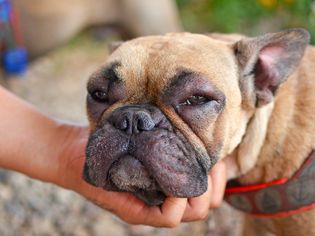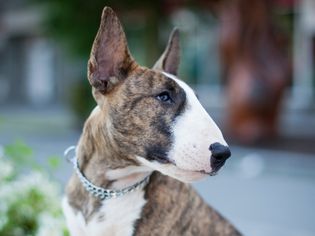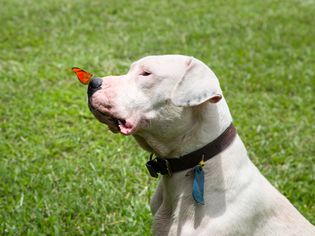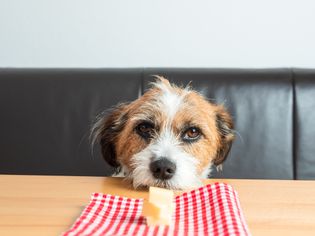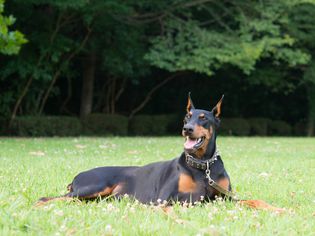If you're looking for a small but active dog, a Chug dog, across between a Chihuahua and a pug might be what you're looking for. Some people consider them a designer breed while others say they are a mixed breed, but they've grown in popularity through the years regardless.
Find out more about the Chug dog, the kind of care they need, and if they're the right pet for you.
Breed Overview
Group: Designer
Height: 10 to 14 inches
Weight: 10 to 20 pounds
Coat: Short or long
Coat Colors: Brown, black, fawn, cream, and white
Life Span: 10 to 13 years
Temperament: Playful, energetic, friendly, alert, active
Hypoallergenic: No
Origin Country: USA
Characteristics of the Chug
Chugs have many characteristics of both a Chihuahua and a pug. Chihuahuas can be nervous, active, and alert dogs while pugs are known more for their companionship and quirky personalities.
They can have some breathing concerns due to their smushed faces. Chugs can inherit any combination of traits from their parent breeds; as with all mixed-breed dogs, it's impossible to say which parent they will take after most.
These small dogs won't make great guard dogs or hunting dogs, but if you're looking for a fun companion that will let you know when someone's at the door and keep you entertained all day, they may fit the bill.
Chug dogs don’t do well when they’re left alone. They may experience separation anxiety and bark. So, if you’re a busy family that spends a lot of time away from home, this breed wouldn’t be the right choice.
| Affection Level | Medium |
| Friendliness | High |
| Kid-Friendly | Medium |
| Pet-Friendly | High |
| Exercise Needs | Low |
| Playfulness | High |
| Energy Level | High |
| Trainability | Medium |
| Intelligence | Medium |
| Tendency to Bark | High |
| Amount of Shedding | Medium |
History of the Chug
The origin of the Chug dog is not well-documented, and there is no one directly credited with breeding the first Chugs. It's thought these dogs were bred to help eliminate the short snout of the pug.
Chihuahuas and pugs are both in the toy dog group, so breeding two toy dogs together ensures the Chug stays small. They are still considered a designer dog breed or mixed breed, so they are not recognized as a purebred dog by the American Kennel Club (AKC) or any other organizations.
Chug Care
Caring for a Chug involves some basic grooming and exercise as well as a little bit of training. Chugs are not as high-maintenance as some breeds, but they still require some time and effort.
Because Chugs are small, they can be great for those living in small spaces, such as apartments. However, caution should be taken when these dogs play with children and large dogs—because they are small, Chugs could get hurt.
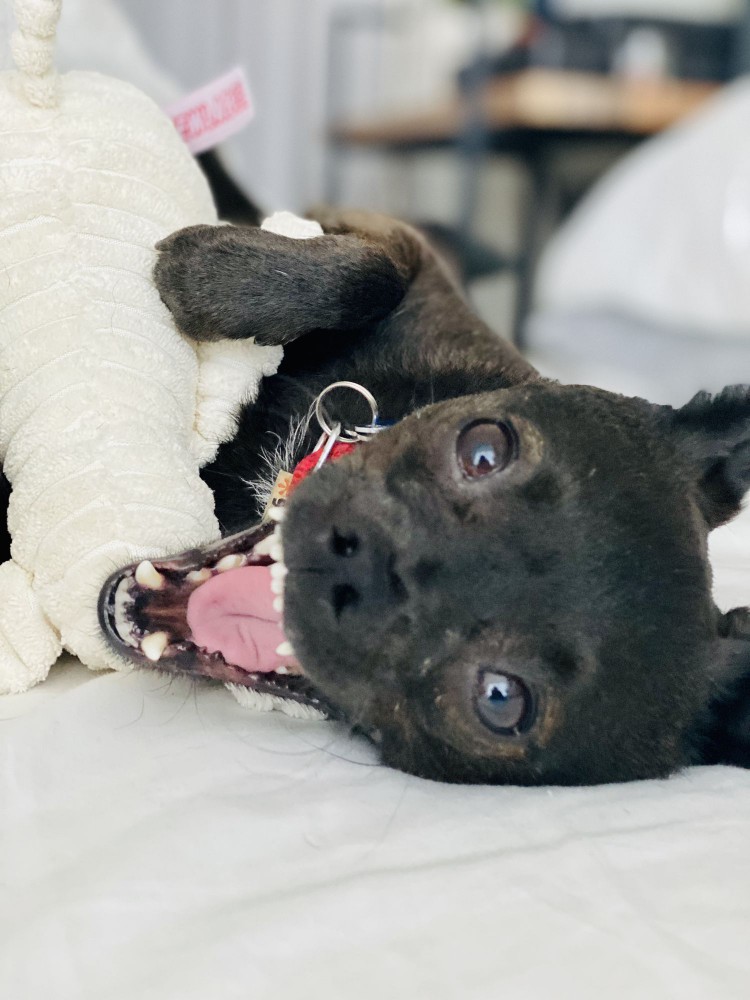
Getty Images/Liza Suh
Exercise
Chugs are usually active dogs, but they don't require as much exercise as those of the hunting and sporting groups. A daily walk or two around the block, a small yard to run around in, or even 15-30 minutes of playtime in the house each day is usually enough exercise for a Chug.
They have little legs and won't be running marathons with you, but they do enjoy a good walk or short run. If your Chug inherits more of a shorter snout from the pug parent, you will need to take more precautions with exercise to keep them safe.
Other activities that Chug dogs may enjoy include:
- Fetch
- Obedience training
- Puzzle toys
Grooming
Most Chugs have short hair like their pug relatives, but if a parent is a long-haired Chihuahua, it's also possible for a Chug to have longer hair.
If your Chug has wrinkly skin, they can develop skin issues. Keep the folds clean and dry to prevent problems.
Chugs do not need haircuts but occasional brushing, baths, ear cleanings, nail trims, and teeth brushing will still be needed. Overall, Chugs don't require a lot of grooming.
Training
The sooner you start training your Chug, the better off you'll both be. Training your chug to come, sit, stay, heel, walk on a leash, and use the potty outside are necessary not only for your home's cleanliness but also for your dog's safety and ease of care.
The best form of training is positive reinforcement. Never be harsh with your dog while training them. Chug dogs are eager to please and smart, so they can be fun to train.
Also, socializing a Chug while they are still a puppy is important, as it helps ensure your dog will be confident around strangers and in new places.
Common Health Problems
Mixed-breed dogs are often healthier than purebred dogs, but that doesn't mean Chug dogs are free of all health problems. Some health problems that are more common in Chugs include:
- Brachycephalic syndrome: This condition affects dogs with flat faces. Symptoms include difficulty breathing, noisy breathing, snoring, and exercise intolerance, among others. These dogs should avoid strenuous exercise and hot conditions.
- Luxating patellas: This is when the kneecap slips out of its normal position. Symptoms include a leg bent at an odd angle, limping, and licking of the knee. Surgery might be required.
- Obesity: Chugs can gain weight easily, especially if they aren’t very active or eat too much. Work with your veterinarian to determine how much to feed them, make sure they get the right amount of exercise, and work with your vet if your dog needs to lose some weight.
- Ocular issues: Pugs can be prone to eye problems like corneal ulcers and dry eye. Watch out for symptoms like redness, pawing at the eye, or excessive tearing that require a vet’s attention.
- Heat stroke: Because of their short snout, Chugs can experience heat stroke. Symptoms include panting heavily, excessive drooling, restlessness, stopping to lie down, and trying to drink water often. Make sure your dog doesn’t spend too much time in hot or humid conditions.
- Dental disease: All dogs can develop dental problems, so brush your dog’s teeth, and look for symptoms like discolored teeth, bad breath, excessive drooling, inflamed gums, and visible tartar. A vet can examine and clean your dog’s teeth.
- Parasites: Internal and external parasites can impact all dogs, and can cause a variety of symptoms, from skin issues to digestive problems. Products like flea and tick preventives are useful, and vets can prescribe medications to get rid of parasites.
- Ear infections: Ear infections can affect any dog. Symptoms include odor from the ears, scratching at the ears, shaking of the head, and ear discharge. Consulting with a vet to get the right treatment is necessary.
Diet and Nutrition
Like all dogs, Chugs should eat a nutritionally complete diet formulated for dogs by veterinary nutritionists. Two meals a day helps to keep blood sugar regulated, and don't forget to measure out the appropriate amount of food based on your dog's weight, age, activity, and caloric content of the food you are feeding.
If you aren't sure what your Chug dog should eat, ask your veterinarian for recommendations. Feeding the proper diet will help prevent obesity and other health issues throughout your dog's life.
Where to Adopt or Buy a Chug
Chugs are often referred to as a designer breed, and can cost $600 or more.
Some breeders will breed them for specific colors or qualities because there is no breed standard, at least not yet. But if you're looking for a Chug, be careful of breeders that only breed for profit or house their dogs in unsanitary conditions.
You should always be able to see the parents of the dog if you are purchasing from a breeder, and breeders should act responsibly by selectively breeding to help prevent poor health qualities from being passed on to the offspring.
Rescuing or adoption is also an option and some Chihuahua or pug-specific rescues may even have Chugs available.
Chug Overview
Chugs are cute little dogs that blend the looks and traits of Chihuahuas and pugs. They are loyal and fun, and great for small homes. They don’t need a lot of exercise, but they need a lot of attention.
Pros of Chug Dogs
- Low-maintenance grooming needs due to their short coat
- Playful and active but don't require a lot of exercise
- Drooling is not typically a concern
Cons of Chug Dogs
- Some with shorter snouts may have breathing issues
- Likely to come from puppy mills or backyard breeders
- Can be vocal and will alert you if they're scared or someone is at the door
More Dog Breeds and Further Research
If you’re interested in similar breeds to the Chug, check out:
- Boston Terrier
- Havanese
- Lhasa Apso
These small breeds are great options, but when you consider mixed dog breeds, your options for finding the right dog for you are endless.
- What’s the difference between a pug and a Chug?
A pug is a purebred dog breed while a Chug is a mixed-breed dog that is a combination of a Chihuahua and a pug. Chugs look similar to pugs but are typically a little taller, slimmer, and have less of a smushed face.
Are Chugs good family dogs?With a little training and proper socialization, Chugs can make great family dogs. As with any dog, watching them closely around children is needed but teaching both the dog and the child how to properly interact is key.
Do Chugs bark a lot?Chugs can be vocal, so if you live close to your neighbors, this might be a problem. Training may help them bark less.


